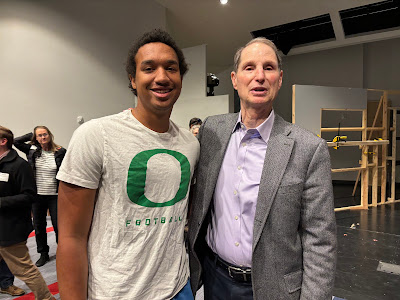Roy Cohn to Donald Trump:
"The first rule is the simplest: Attack. Attack. Attack."
Trump was famous long before he came down the escalator. He was famous even before the NBC reality TV show, The Apprentice.
The Apprentice: Moving the Needle?
In an interview in the print version of The New York Times last Sunday, Jeremy Strong, who plays Donald Trump’s mentor Roy Cohn remarks on the timing of The Apprentice’s recent release in the US – “incredibly fortuitous that it can come out at a moment where it has the potential to illuminate something about the inner workings of this man” – and the possibility that it could become a game-changer: “I think it offers vital insight which could move the needle in a real way.”
A Devil Mentored by Devils
In The Social Network, another bildungsroman, Aaron Sorkin has one of his characters – a lawyer who mentors the fictional Mark Zuckerberg – opine that every creation story needs a devil. At its heart, this creation story has several, Donald Trump himself, his father Fred, and most importantly, his eventual surrogate father Roy Cohn. From Fred, Donald imbibes the message that there are two types of people, killers or losers. Then Cohn provides a three-part roadmap for becoming a killer: first, attack, attack, attack; second, admit, nothing, deny everything; third, always claim victory, never admit defeat.
Not only does The Apprentice portray a person whose political modus operandi exemplifies dishonesty and negativity, but it heightens its disdain by showing Trump’s relationships with other people as purely self-interested and transactional. Trump thus disposes of his mentor when he is suffering from AIDS. And his marriage to Ivana is equally exploitative. The movie also mentions Trump’s amphetamine habit and his physical self-improvement through hair implants and liposuction.
When Ivana tries to spice up their sex life by giving him the best-seller The G-Spot, he responds by telling her he is no longer attracted to her and doesn’t like the feel of her augmented breasts; when she answers back, he rapes her. Trump dismisses his girlfriend Marla Maples – a non-speaking role – by walking away, unconsummated, from her blowjob when he gets a business idea. The film’s depiction of Trump is thus loathsome and disgusting, evil and weird.
Will this melange of historical fact and cinematic embellishment move the needle in the current election campaign? The film hasn’t had particularly large audiences or rave reviews. After its initial showing at the Cannes Film Festival, Trump has attacked it (rule 1) and denied there is any truth to it (rule 2). And we know that many voters support Trump despite an assessment of his character similar to this film’s because they endorse his political agenda, especially his America-first hostility to immigrants and mercantilist economics.
Acting and Emplotment
The film’s strength is that the actors in the three major roles are convincing: Jeremy Strong depicting Roy Cohn’s unflappable cynicism, Sebastian Stan expressing Donald Trump’s ambition and self-centeredness, and Maria Bakalova portraying Ivana Trump as a woman trying to be a loving spouse and mother in an impossible situation.
The film’s major weakness is how its plot was structured. To avoid the dreariness of chronology, writers and directors of biopics often build the plot around a revealing and pivotal aspect of the protagonist’s life and present it as a quest to achieve a key goal. For example, Steven Spielberg in Lincoln focused on Lincoln’s political strategy and machinations to convince the House of Representatives to confirm the thirteenth amendment, outlawing slavery. Similarly, Aaron Sorkin, in The Social Network, used Mark Zuckerberg’s legal battles with his former partners for shares of the value Facebook created. Reagan, while not nearly as successful as either of these movies, revolves around on Reagan’s opposition to Communism, in particular his efforts to overthrow the Soviet Union.
The Apprentice begins with Trump’s quest to build the Trump Tower, but after that quest is completed two-thirds of the way through, it segues to Trump’s efforts to build a casino in Atlantic City and his ensuing business and marital troubles. It thus becomes merely a chronological treatment of Trumps’ rise to prominence between 1973 and 1986. In the culminating scene of the film, Trump is interviewed for The Art of the Deal and tells biographer Tony Schwartz that what you see is what you get, and any attempt at psychological explanation will be fruitless. This biopic admits defeat in the key task of that genre, shining an interpretive light on personal development.
Homage to Oliver Stone
Before concluding I must mention that The Apprentice includes an homage to Oliver Stone’s Wall Street. Wall Street’s famous limo scene involves Gordon Gekko (Michael Douglas) convincing his acolyte Bud Fox (Charlie Sheen) to cross over the line to criminality while The Apprentice has a scene where Roy Cohn, riding in a limo with Trump, shows him how to make a convincing phone call. While I chuckled at the homage, I thought the original was a far stronger scene. I’ve included the links, so you can decide for yourself.
An Alternative to CNN
In the last week before the US election, I admit to spending a lot of time watching CNN, reading The New York Times, obsessively checking 538, and reading more than a few writers pointing out the potential inaccuracy of polls in a close race in which turnout and shy voters’ misleading responses to pollsters are important factors. Seeing this film was an attempt to look for a different perspective on the events unfolding this week; it’s no classic, but it’s appropriate entertainment.
[Note: To get daily delivery of this blog to your email go to:https://petersage.substack.com Subscribe. Don't pay. The blog is free and always will be.]


























